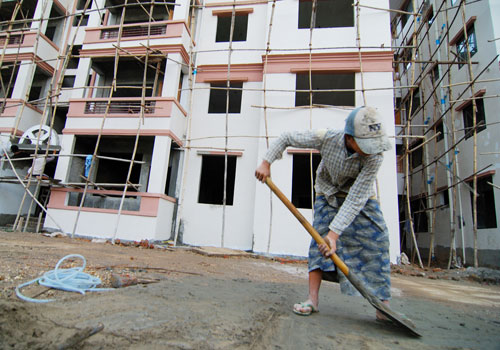

 Anticipation is building in many sectors ahead of a workshop in Nay Pyi Taw this weekend, where the government has invited business leaders to discuss the new rules governing investment and how this will mesh with the long-awaited economic policy.
Anticipation is building in many sectors ahead of a workshop in Nay Pyi Taw this weekend, where the government has invited business leaders to discuss the new rules governing investment and how this will mesh with the long-awaited economic policy.
Eagerly awaiting the outcome of the session are many in the property sector, who are hoping for a more consistent tax regime and a more stable legal framework to encourage foreign investment into the industry.
The property market has faced a general decline over the past year, and brokers say demand is slumping.
Real estate agents say investors are waiting to see what planned regulatory assurances will be offered for local and foreign investors alike under the new policy.
Chief among the concerns of those in the property industry are regulations pertaining to tax on real estate transactions. Brokers say policy inconsistency meant that, under the former government, some buyers managed to evade paying their dues.
“Although the real estate sector had many investments and transactions, the previous government didn’t receive all of the revenue from this because people avoided paying taxes,” said Yangon Real Estate Entrepreneur Association (YREEA) executive U Khin Maung Aye. “We hope this sort of problem will reduce in the term of the current government.”
The government’s 12-point economic policy plan, revealed in July, stated the development of a fair and effective taxation was a key priority. While the policy outline did not directly deal in detail with the real estate sector, industry insiders say the government’s handling of taxation and investments will have widespread implications for the industry.
U Khin Maung Aye said this could see revenue boosted, but also offer an opportunity for greater transparency.
“In most property transactions, a deal is made between buyers and seller about the on-paper contract, and they rarely try to pay taxes,” he said, referring to the practice of buyers being granted “special power” or general power over a property by the seller – a common way to dodge tax payments.
This approach is often used by market speculators, who purchase property with the intention to on-sell.
“Their transactions don’t go to government revenue,” he said, noting higher-end property deals done by Myanmar’s wealthy often fall into this camp. The majority of property tax payments are on smaller deals, he said.
The government has scheduled a meeting for October 22 in Nay Pyi Taw where it is seeking input from business leaders into investment rules after the investment law recently passed through parliament. Officials have said they expect to reveal more details of the economic policy, following the release in July of a 12-pont outline.
Real estate entrepreneurs said that they are hoping the new policy will help pave the way for more foreign investment.
“There is a lot of land to invest in and to do business with, but there is no implementation yet. After the new economic policy is set up and if it is stable, foreign countries will dare to come and invest here. Once that happens, the real estate sector will improve,” said real estate agent U Maung Maung.
Under the 12-point policy brief, the government announced the intention to develop regulations to foster foreign direct investment. It is believed there will be a heavy focus on responsible business, as well as promoting rights of investors and security of investments.
The Condominium Law, passed in January, allows foreigners to buy up to 40 percent of apartments in any given condo block, provided the apartments are on the sixth floor or above. Daw Moh Moh Aung, secretary of the Myanmar Real Estate Service Association, says that while this was a welcome development, there is still a major policy and regulatory gap as far as foreign investment in land is concerned.
“We should have that kind of law enacted for industrial [property investment]. That would be help for investors,” she said.
Earlier this month, U Min Htein, director general of the Department of Urban and Housing Development of the Ministry of Construction, told The Myanmar Times that there were delays in the issuance of by-laws that would allow sales under the Condominium Law passed last January.
The absence so far of the necessary by-laws has prevented the law from entering fully into force. It is hoped the by-laws will be developed and released by December, setting out detailed regulations and procedures.
Real estate agents are also awaiting the creation of a real estate services law, which they say would boost the standard of the services provided by the industry and instill confidence in would-be investors.
“The real estate sector will improve when foreign investment comes into the country. For those investors, the country needs to have strong policy and laws,” said Daw Moh Moh Aung. “We hope the new economic policy will open up to foreign investors.”
Quoted from mmtimes.